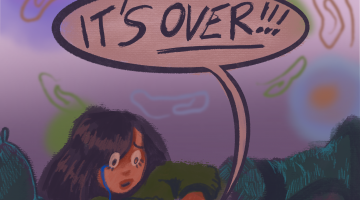The instructions were simple: share something with the rest of the fraternity that helps the brothers understand you better. Having only been a member of Alpha Tau Omega fraternity for two months, I started to wonder if this was my opportunity to finally share something that I had carefully hidden throughout my pledge process. My stomach began to backflip as I contentiously debated what I should say. By the time it was my turn to speak, the color from my face had completely drained and my ability to create coherent sentences seemed like a distant memory. It felt as though I was watching my own body walk to the front of the chapter with no control to stop it. I took a final look at my feet, inhaled deeply and then the words poured out of me.
“Some of you may or may not know this, but I’m gay.”
Coming out of the closet as a senior in high school had been a challenge in itself, but coming out in front of a group of men that I hoped would accept me as a brother felt like a marathon run I wasn’t sure I could finish. Throughout my pledge process in fall 2012, I constantly battled the thought of how, if ever, I would tell these men the truth about myself. The same doubt that once overcame me as a 17-year-old boy found its way back into my life in a cycle of doubt, fear and self-loathing.
When I decided to rush a fraternity as a sophomore, I convinced myself it would be a delicate situation in which I would have to be careful about sharing myself completely. I felt the need to apologize for my sexuality, as if it made me less worthy of brotherhood.
I relied on ill-conceived stereotypes of fraternity men as close-minded, testosterone-driven meatheads that would turn their noses up to a gay speech and debate nerd that had never played a high school sport in his life. I categorized the fraternities in my head, identifying some as “potentially gay-friendly” and others as “run the other way.” I started to embody exactly the type of person I hated: full of judgment and unfair assumptions.
Despite my internal battle, the rush process proved to be welcoming and rewarding. As I checked out each house, it became clear that Alpha Tau Omega was the right fit for me. At the end of the week, I cautiously accepted my bid with an understanding that I would be the only openly gay member of the chapter at that time.
To calm my insecurities, I constantly reassured myself that if the promise of brotherhood was truly as special as many had explained to me, then these men would learn to love me no matter what. And although I felt that I was lying to myself the whole time, something spectacular happened the night I came out: again, they accepted me.
To be honest, though, it didn’t immediately feel that way in the moment. Standing in front of the chapter was one of the loneliest and most vulnerable experiences of my life. It felt like each pair of eyes was scanning me, judging me for the fool I had just made of myself. I slowly walked back to my spot when, all of sudden, I felt hands firmly grasp my shoulders.
“That was really cool what you did,” whispered an older and highly-respected member. “Just know that this will change nothing about how the chapter feels about you. We’re proud to have you here.”
In that moment, I realized that I had never actually been alone at all. I looked around at each brother’s face beaming at me with loving approval. I had spent so much time trying to gain acceptance by hiding who I was, when in reality, these were the people that wanted to truly know me the most.
For me, being a part of a fraternity means much more than “paying for your friends” or “chilling with some dudes” — it means joining a community that will do anything to help you grow and become the person you hope to be. As a member of ATO, I have been fortunate to find myself in a way I never thought possible. And in my experience, this rings true across all of fraternity and sorority life. I’ve had the privilege of hearing story after story of personal growth and development from each of the chapters on this campus.
I’ve even been lucky enough to meet and identify with other gay men and women that struggled with misconceptions about fraternity and sorority life. Fraternity men and sorority women come in all shapes and sizes, and an identity should not and never will exempt someone from the pleasure and unconditional love of being part of a chapter.
Granted, fraternities and sororities are not for everyone, and that’s OK. What’s most important is finding a community that enables you to be the best version of yourself. For you, it may be a sport or club, but for me, it’s the best brotherhood I’ve ever known.
Never let your fears of judgment hold you back from being who you aspire to be, because you never know which community may change the rest of your life.
Daniel Coffey studies journalism. He can be reached at dcoffey@unr.edu.










